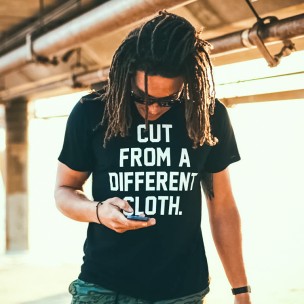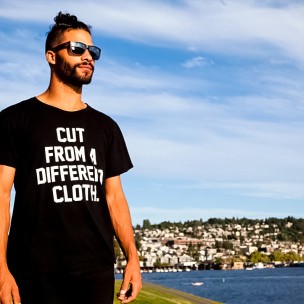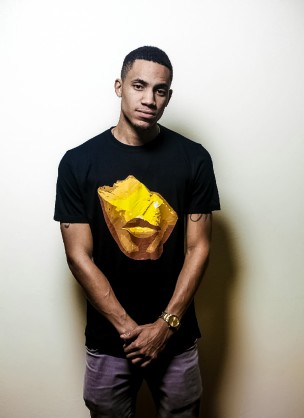
“Everyone thinks you’re pretty crazy when you quit your day job to pursue something different,” said Tommie Lark ’12, cofounder of Superego Clothiers, LLC, a hemp-based streetwear brand.
Lark has a point: People love to crush dreams. Still, though, the bizarreness of his story isn’t lost on him. In 2010, Psychology majors James He ’11, Matthew Narkaus ’11, and Lark had an idea: What if they started a clothing company selling garments cut quite literally from a different cloth?
“[Narkaus] was into music, we were all psychology majors, [and He] had an econ background,” Lark said. “So we were kind of interested in fashion, a little bit, and sports culture.”
It took only one cleverly named Boston clothing store to set things in motion.
“James [He] was actually walking on Newbury Street in Boston one day and went into a store called The Hempest,” Lark said. “They have a bunch of different hemp-blended T-shirts and things like that. He came across a really soft, comfortable blend. We started printing on that, actually. So we deemed ourselves a sustainable streetwear brand with a focus on hemp.”

The first step was to print up some T-shirts on their fabric of choice—hemp—and sell them from Lark’s Butterfields dorm room. Hemp, as it turned out, wasn’t quite the novelty the men had anticipated; competition proved itself challenging.
“There were so many other people doing similar things, so we were trying to figure out a way to separate ourselves from everyone else,” he said.
That quest drove Lark, He, and Narkaus to develop a business mindset that aligns with that of their generation. Superego, named for the founders’ common major, psychology, went ethical.
“We realized that there were a lot of millennials out there, a lot of individuals who resonated with being cut from a different cloth,” Lark said. “We were able to build a pretty big following through social media and were able to connect with a lot of creatives and activists and leaders around the world, ranging all ages—people in their 60s, even, to early teens—who are saying that they’re cut from a different cloth.”
Soon after the early Butts venture, Lark, He, and Narkaus collaborated with and sold five other sustainable brands, including a vegan footwear line, a company that used bamboo fabric, a manufacturer of hemp bracelets, and one of recycled wallets. As a small brand with little capital, however, Superego struggled to focus on its own growth while retailing other groups’ merchandise.

“We never knew what the brand would grow into,” Lark said of those early trials and errors.
A recent breakthrough for Lark, He, and Narkaus was securing a manufacturing partner in Dhaka, Bangladesh; with slashed production costs, Superego has been able to place products in showcases in trade shows. More importantly, lowered prices increase chances for resale at boutiques.
“Everybody wins when production cost is low,” Lark said.
Even, according to Lark, the factory workers.
“Everything is certified, meeting all the U.K. and U.S. regulations,” he said. “We made sure we have all the certificates, and we’re planning a trip to see our factory in the next couple of months.”
Superego’s factory location is just one of the ways in which it’s gone global.
“We started as Wesleyan with one hundred tee shirts in our dorm room, and we’ve grown into a brand that has over sixty thousand followers around the world on Twitter, and we have close to 50 brand ambassadors in nine countries around the world,” Lark said.
According to Lark, Superego’s popularity, and its affinity for activists, is that it’s rooted in environmentalism. Workers produce items from seed to stitch, processing raw hemp into a fibrous yarn, which is then woven into fabric for T-shirts.
“The hemp crop is very sustainable in itself, despite the negative stigmas attached to it with marijuana,” Lark said. “Hemp is actually one of the most sustainable, strongest natural fibers. It’s not a very water-intensive crop. When you make a hemp tee shirt [as opposed to a cotton tee shirt] you use half the water.”

Lark expounded the virtues of hemp over cotton.
“There are over two billion cotton T-shirts purchased each year, so that’s a lot of water being wasted that could potentially be cut in half if we switched to hemp,” he said. “It releases a lot of oxygen into the environment. Hemp also replenishes the soil it’s grown in.”
It may be earthy, but you won’t catch Lark, who now wears exclusively his own products, in earth tones.
“We’re trying to not associate with the stigma of ‘eco fashion,’” he said. “We want it to be visually appealing. We noticed a lot of these sustainable brands are neutral colors, blank, bland stuff.”
So the guys hired Walter Cruz as their creative designer. Cruz spearheaded the holiday collection, which consisted of one thousand pieces that Superego sold in three months. Their next collection debuts next spring.
Click over to superegoclothiers.com, and you’ll find that Lark’s promise holds true: The site sells bright, graphic T-shirts, as well as plain jersey tops for more conservative dressers.
“Eventually we want a whole catalogue of products, from sleepwear to street wear to more business-oriented stuff as well, because we do have the capabilities with our factory now,” Lark explained. “We’re taking things step by step and working our way up.”
Dreaming big has never been an issue for Superego, which recently launched a massive kickstarter.com campaign to raise $25 thousand in a little over a month.
“Superego would like to be one of the top fashion brands, street wear fashion, lifestyle brands known for changing the very fabric of reality—making the first big push to make hemp T-shirts the standard over cotton T-shirts,” Lark said. “We hope to have physical locations across the U.S., France, and the U.K.”
Lark reflected that although the University didn’t shape his sense of style, per se, something in the atmosphere fueled his ambition to do something different.
“Wesleyan is so liberal in the sense that it encourages you to find yourself and be that, [so] in going to Wesleyan, we were able to find ourselves and be that,” Lark said. “And we’re showing that through our brand.”



Leave a Reply